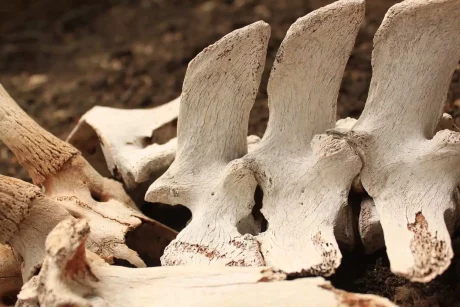
© 2023 House of Health. All rights reserved.
Web Design by Netbloom
Web Design by Netbloom
Osteoporosis is characterised by low bone mass, which leads to an increased risk of fractures, especially the hips, spine and wrists. There are a number of dietary and environmental considerations that can affect bone density and help to prevent fractures from occurring.

A new study, presented at the Endocrine Society’s 100th Annual Meeting in Chicago in March, involving 103 healthy post-menopausal women from Brazil, found that those who followed a Mediterranean diet presented with significantly higher bone mineral density and muscle mass than those who didn’t.
The Mediterranean diet centres around a high intake of fruit and vegetables, potatoes, grains, olive oil, seeds and a moderately high intake of fish. Saturated fat, dairy and red meat are limited while red wine is consumed moderately. The diet is high in antioxidant, anti-inflammatory and alkalising properties, which are likely to be contributing factors to the bone-sparring effect.
Results of a 2016 study found that the risk of osteoporosis in women with diabetes and in post-menopausal women may be cut by consuming flaxseed oil.
The research, undertaken on rats, indicated that bone mineral density and bone content in a diabetic group of rats were reduced and this abnormality was resolved after receiving flaxseed oil.
Measurable markers for bone resorption in urine that are associated with osteoporosis were reduced in the group receiving flaxseed oil.
The research team concluded that diabetes is an incredibly significant risk factor for osteoporosis and they suggest that diabetes in post-menopausal women may pose a greater risk for osteoporosis than the natural decline in sex hormones associated with menopause. These risks can be reduced by the consumption of flaxseed oil.

According to a recent study by researchers from Columbia University, new research is highlighting higher rates of osteoporosis in communities with exposure to air pollution as it causes widespread free radical damage and inflammation that can accelerate bone loss.
This has been determined to be caused by elevated levels of “particulate matter” – a component of air pollution. Particulate matter components are also found in cigarette smoke, which has been commonly associated with bone damage.
Today, the bacteria in the gut are implicated in many disease-states and recent studies have found bone health to be no different.
New research, conducted using germ-free mice, has discovered a link between bone health and the regulatory influence of the micro biome (gut bacteria). This has been attributed to the affect the gut micro biome has on the immune system, as around 80% of our immune system is located in and around the gut. It has been found that certain immune cells can regulate bone density and an imbalance in regulation can lead to osteoporosis.
These findings highlight the importance of gut health in general and the benefits of optimising your micro biome.
High salt intake has also been studied as a risk factor for osteoporosis as it leads to increased calcium in the urine, which may lead to increased bone loss. However, when calcium intake is at or above the currently recommended levels there appears to be no detrimental affect of high salt intake on calcium levels and bone mineral density. The body adapts to the situation by increasing calcium absorption, offsetting the loses through the urine.
There is limited evidence that supports the benefit of reducing salt intake on bone health with studies instead advising adequate calcium and potassium intake as a means to protect the skeleton. When potassium intake is within the recommended range it can also reduce or prevent salt induced calcium urinary loss.
Our body functions best in an alkaline environment, with a pH of just above 7.0.
An article published in the May 2017 issue of Nutrients highlighted that when the body becomes more acidic, base stores in the body are called upon to restore alkaline balance. Calcium in the bones is the body’s largest store of alkaline base. When the body is too acidic, calcium and potassium in the bones are broken down and released into the blood stream, reducing bone mineral density and increasing the risk of bone fractures.
A diet high in fruit and vegetables (like that of the Mediterranean diet) is a great way to restore this balance.
Recent research has found potassium supplementation to be beneficial in this regard as it too acts as an alkaline base and can act to neutralise the acidic environment without the need for the minerals in the bones to be released.
Previous information has advised against diets that are too high in protein for people who are at risk or who have osteoporosis. This is due to the concern that high protein diets may increase urinary excretion of calcium, which is an important mineral in bone health.
A recent study published in volume 89 of the Journal of Clinical Endocrinology and Metabolism (pages 1169-2273), found no significant difference in urinary calcium excretion in those eating a high protein diet compared to a low protein diet. Instead it found that participants who increased their protein intake by 58 grams per day presented with 25% higher levels of bone growth factor. Their rate of bone reabsorption was also lower than the control group. These two factors are indicators of good bone health.





We are often asked about cooking oils. What is the best oil for cooking? What oils shouldn’t we cook with? Common opinion
House of Health Ltd
Some customers are experiencing glitches in the payment gateway but our IT folk are stumped. If this happens to you, we'd appreciate a screenshot or screen recording. Dismiss
Stay informed: Get expert tips, free advice, updates, recipes, and special offers delivered straight to your inbox.